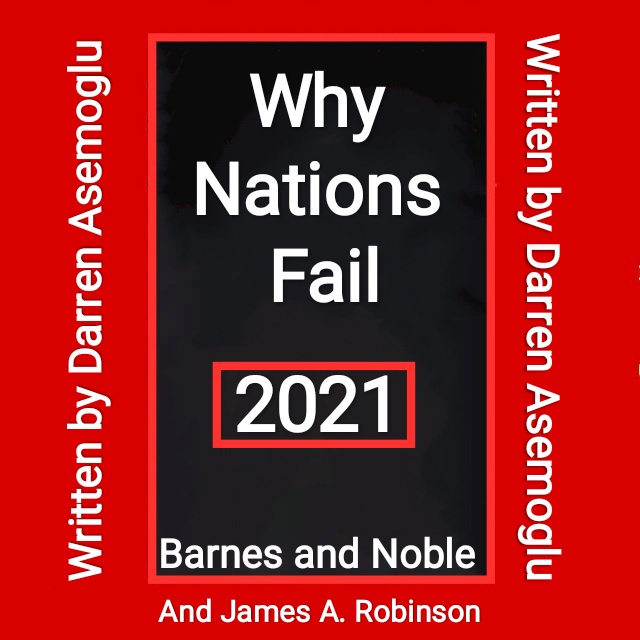Why Nations Fail Barnes And Noble
"Why Nations Fail" is a great attempt to explain the gut-wrenching poverty that struggles to make 1.22 billion people in the developing world live on less than 1.25 a day. You can expect it to be a faded and extraordinary read. It's not. It’s breaking, girls, wildly ambitious and ultimately optimistic. It could, in fact, be a bit of a masterpiece.
Darren Asemoglu and James A. Robinson, two powerful, widely respected development scholars, began with a bit of perspective:
-
even in today's sticky economic climate, the average American is seven times richer than the average Mexican, 10 times richer than the average Peruvian, about 20 times richer. Rich and about 40 times richer than the average citizen of particularly desperate African countries like Mali, Ethiopia and Sierra Leone. What is such a volatile inequality?
The Authors' Answer is Simple
"Institution, institution, institution". They are impatient with the relentless socio-economic argument for the perseverance of poverty, which in various ways tends towards geographical destinies, cultural patterns or ignorant leaders and technocrats. Instead, the "
Why Nations Fail" poll focuses on historical historical currents and critical twists that mold modern politics:
- The processes of institutional flow that produce political and economic institutions that may include-power sharing, productivity, education, technological advancement, and so on; Or extraction-bent on occupying resources and resources away from a section of society for the benefit of others.
- To understand what extracted institutions look like, consider Lemon Grasse Legumes (Big Vegetables), the popular Congolese nickname of the obscenely papered circle around Mbutu Sesse Seko, this powerful man who now ruled the Democratic Republic of Congo from 1950 to 1997. The authors believe that Mbutu decided to build a palace for himself at his birthplace, confirming that the airport has an aircraft landing strip so that he can fit the Concordes rented from Air France. Mobutu and large vegetables were not interested in developing Congo. They were interested in strip-mining it, sucking up its huge mineral resources for themselves. They were the best, vampire capitalists.
- But the roots of the Congolese nightmare of poverty and strife go back many centuries. Before the arrival of the European imperialists, then known as the Kingdom of the Congo, the elite pioneers ruled over the big vegetables who drew their great wealth from voluntary taxes and the busy slave trade. And when the European colonists showed up, they made a horrible situation worse-especially under the Buddhist rule of King Leopold II of Belgium.
When Congo finally gained independence in 1920, it was a weak, decentralized state with a predatory political class and a burden of exploitative economic entities-too weak to provide basic services but strong enough to keep Mobutu and his cronies at the top;
- Its very poor in terms of granting citizenship but rich enough to give the elite something to fight for.
- Asemoglu and Robinson argued that when you associate rotten regimes, exploitative elites, and self-serving institutions with weak, decentralized states, you have something close to a prescription for poverty, conflict, and even complete failure. The authors write, "When nations have extractive economic institutions, when supported by dormant political institutions that hinder or even hinder economic growth."
- Just as the vicious circle like the Congress can alleviate even poverty, the vicious circle can help divert the long pressures of history towards growth and prosperity. Compared to the conflict and misery of the Congo, Botswana-which had only 22 university graduates since independence in 1966, had seven miles of paved roads and a bright white-hegemonic regime at most borders. But Botswana today has "the highest per capita income in sub-Saharan Africa"-around the level of success stories like Hungary and Costa Rica.
The Authors Wrote
How did Botswana pull it? "Inclusive economic and political institutions develop rapidly after independence." Botswana regularly elected, never fought a civil war, and exercised property rights. The authors argued that they benefited from a tradition of moderating the state and limiting the power of tribal chiefs to survive under tribal colonial rule. When diamonds were discovered, far-sighted law ensured that new wealth was shared for national progress, not for the rich. In the crisis of independence, Botswana leaders, such as its first (1st) president, Seretti Khama, and his Botswana Democratic Party, chose public interest in democracy and personal greed for dictatorship.
In Other Words
In other words it's politics, stupid. The firm Botswana succeeded in creating an organization that could achieve prosperity. Mobutu's Congo and Robert Mugabe's Zimbabwe did not even try. Asemoglu and Robinson argued that protesters in Egypt's Tahrir Square had a right to:-
They are held by a shameless, corrupt state and a society that does not allow them to fully utilize their talents. Egypt was poor "obviously it was ruled by a narrow elite who organized society at their expense at the huge expense of the people."
- The left authorities in the unhappy countries, such as North Korea, Sierra Leone, Haiti and Somalia, have concentrated on a handful of resources that they can use to strengthen their grip on power.
The Formula is Complete
Financial prosperity, growth and sustainable development of the governments and agencies involved;
- Passive governments and institutions mean poverty, privatization and stagnation-even for centuries. The depressing cycle where one ruler often replaces another means that "the countries that did not originally spread the Industrial Revolution were relatively poor." Nothing succeeds like success, Asemoglu and Robinson argue and nothing fails like failure.
- So what about China, which is increasingly cited as a new model of “authoritarian growth”? The authors are respectful but unpublished in the end. They readily acknowledged that emerging governments could create temporary economic growth if they became politically centralized-just consider the pre-Brezhnev Soviet Union, whose economic system once had its own Western admirers. However, "China's economic institutions are more involved today than they were three decades ago," he said, adding that China is still fundamentally involved in a lifting system.
It Starts Weaving in Short Form
In fairly short order, such authoritarian economies begin to weave:
- with the impetus for technological advancement, creativity and innovation, they stop sustainable, long-term growth and prosperity. ("You can't force people to think and come up with good ideas by threatening to shoot," the authors argue.) Produces sustainable innovation and growth. By importing foreign technology and exporting low-end products, China is playing a catch-up-enthusiastic game-but that’s not how the horse wins.
- So how can the United States help the developing world? Of course foreign aid is not cut or it is by conditioner; As the authors note, you can hardly expect a person like Mbutu to suddenly throw exploitative institutions that have imposed his power “for some more foreign aid” and even got some relief from frustration, much more than if handled inefficiently. Nothing good. But in the end, instead of leaders trying to oppose the interests of their people, we want to be better than creating a foreign aid structure that seeks to bring in marginalized and disadvantaged groups and leaders and empower a broad segment of the people. For Asemoglu and Robinson, just switching one set of oligarchs for the other sets is not enough.
It's Not Correct
"
Why Nations Fail" The basic classification of exclusion versus inclusion begins to be repeated. After Brewer's chapters, the authors seem almost sweet about the ambiguity of their concluding policy advice. And their opportunity and enthusiasm provide both admirable encouragement-the Soviet Five-Year Plan of the Neolithic Revolution and a specific representative chapter of the ancient Mayan city-states and caution from time to time.
It will take several battalions of regional experts to double-examine their history and analysis, and while the overall picture is detailed and convincing, the authors must have a truly superhuman batting average to get every advantage. For example, their treatment of the Middle East is largely inspiring, but they are somewhat harsh on the Ottoman Empire, which they wrote about, not to mention its chaotic diversity and comparatively inclusive socioeconomic politics. And places for entrepreneurs.
Asemoglu and Robinson took the risk of ambition and with joy. For a book about frustrated science and some frustrating misery, “Why
Nations Fail-Book” is an amazingly interesting lesson. This is a great book in every sense. Readers will expect that it makes a big difference.
Warren Bass is a veteran political scientist at RN & Corporation and a former adviser to US Ambassador to the United Nations Susan Rice.
A source of strength, prosperity and poverty

















